Reversal of fortune: Albemarle House goes on the block
For former billionaire's wife Patricia Kluge, the auctions, the lawsuits, and the loss of the winery bearing her name combined to make 2010 seem to be a very bad year, an annus horribilis as the Queen of England once quipped. Unfortunately for Kluge, 2011 may be worse.
Last year, Kluge put her jewelry, furnishings, and even her clothes up for auction in a bid to stave off creditors. Yet in December, she and her husband, a one-time state wine leader, lost their 960-acre winery to foreclosure, crushing the couple’s dream of bringing high-quality Virginia wine to the national market.
Now, another auction looms. Albemarle House, the mansion where Patricia Kluge once entertained kings, princes, and U.S. presidents in haute grandeur, has been foreclosed upon.
"That house was built at a time when an inkling of that style existed," says architect David Easton, who designed Albemarle House. "The issue in this day and age: It is not 1900."
On the steps Creditors have slated February 16 as the day that Albemarle House will be sold on the steps of the Albemarle courthouse, the owner of the Georgian mansion allegedly in default on the nearly $23 million mortgage.
In the wake of the American housing collapse, a foreclosure story is not unusual, but Kluge's is on a much grander scale.
One of the largest houses in the county with 23,538 square feet, the mansion was listed for sale 15 months ago for $100 million, a record-setting price that now has dropped to $24 million.
According to court records, the amount borrowed on the house, Kluge Estate Winery, and the Vineyard Estates subdivision totals at least $66 million, another chart-topping figure.
A little over a year ago, another local real estate venture faced a similar debt crisis. The owners of Biscuit Run, delinquent on their loans, turned to departing Virginia governor Tim Kaine to rescue their flopped residential development as a park with the help of federal transportation money and state tax credits.
Kluge is well acquainted with governors, having helped Democrat Gerald Baliles launch the Virginia Film Festival and later donating use of Albemarle House to fund the successful candidacy of Democrat L. Douglas Wilder. Kluge's husband, Bill Moses, a former IBM executive, has been appointed to statewide leadership roles in the wine industry by various Virginia governors, including one Republican.
But unlike the owners of Biscuit Run, neither Kluge nor Moses appears to have a governor eager to rescue the couple's real estate and business adventures. While Kluge declined to comment for this story, Moses agreed to sit down with the Hook to offer his perspective on the uncorking of a dream.
Pathway to collapse At the Wachovia building downtown, Moses meets a reporter in a top-floor conference room at the law firm of LeClair Ryan, bearing a briefcase full of papers charting the collapse of an empire and the ensuing lawsuits.
To lay out what happened, he harks back to the halcyon days before the eruption of the banking crisis, and pulls out a binder from Rothschild, a prestigious centuries-old investment bank.
"We were approached by Rothschild," says Moses, "with a plan to raise $25 million. They were going to partner us with international companies. They valued the winery at $72.8 million."
Moses says that in July of 2008–- a time now seen as the eve of the American banking collapse–- Kluge Estate Winery had found an equity investor ready to sign. However, in August, says Moses, with financial firms spiraling into turmoil, the property's lender had some bad news. Farm Credit was calling its $34.8 million loan.
"No one was going to invest," explains Moses.
He claims that it was a non-monetary default that triggered the Staunton-based bank's action, that the winery simply did not meet its 2007 sales projections.
"There was no way we could immediately repay the loan," says Moses. "We had over-leveraged the company."
For year and a half, the bank worked with the couple to deal with the debt. “It was," Moses says, "like swimming laps with lead weights."
A 'national' wine
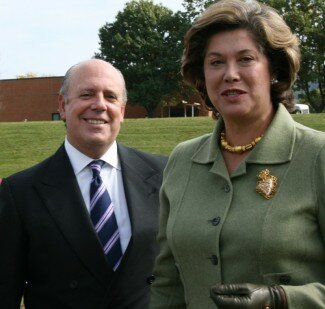 Bill Moses and Patricia Kluge at the 2008 groundbreaking of the PVCC science building to which they donated $1.2 million to promote viticulture. PHOTO BY LISA PROVENCE
Bill Moses and Patricia Kluge at the 2008 groundbreaking of the PVCC science building to which they donated $1.2 million to promote viticulture. PHOTO BY LISA PROVENCE
As with horses, a winery can be a rich person’s enterprise– as well a patient person's. It takes three or four years to get new grape vines to bear their first fruit. Then there's the time in a bottle and time to market. All in all, it's a long run for the ros©s.
In early 2002, Kluge appeared on the CNBC network touting wines starting at $80. Host Liz Claman registered surprise by calling it "an interesting price point."
Later that year, Kluge organized a wine symposium at UVA's business school featuring legendary winemaker Robert Mondavi. Nobody could say that Kluge didn't aim high.
Unlike the majority of Virginia wineries that may produce 5,000 cases a year, Kluge and Moses wanted to bottle 50,000 to 60,000 cases annually.
"To build a national wine," says Moses, "you have to be prepared for operating losses."
Last year, to keep the business afloat, Kluge began liquidating her personal property. In April, she auctioned off her jewelry, and the $5 million proceeds went to the winery loan, says Moses.
In June, Kluge invited Sotheby's to conduct an on-site auction to convert paintings and other Albemarle House treasures into cash. That auction brought in $15.2 million, including $3.8 million for a single Imperial Chinese clock.
“Everything she has has gone to save the winery,” says Moses. “She did everything she could.”
While the winery was swimming in red ink, it was winning awards and lining up contracts with national hospitality corporations like Marriott and Hilton.
"We were in 20 states," says Moses, "when the bank pulled the plug."
A cluster of estates
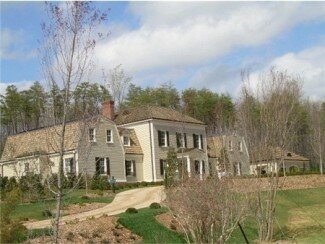 The 6,600-square-foot spec house dubbed "Glen Love" is the first house built in Vineyard Estates and is assessed by the county at $2.8 million. ALBEMARLE COUNTY PHOTO
The 6,600-square-foot spec house dubbed "Glen Love" is the first house built in Vineyard Estates and is assessed by the county at $2.8 million. ALBEMARLE COUNTY PHOTO
Kluge and Moses didn't confine their entrepreneurial ventures to the vineyard. Right across Carter Mountain Road from Albemarle House they erected a pair of giant gates to front a parcel they subdivided as Vineyard Estates.
However, hardly anyone bought any of the homesites, and even the one spec house had trouble.
After a North Carolina-based business partner went bankrupt last year, Kluge and Moses rescued the 6,600-square-foot spec house from foreclosure. They named it "Glen Love," and they moved into it.
They aren't the only ones who miscalculated the desirability of living on a brand new farmette in southern Albemarle.
Two miles away on Blenheim Road, a planned 40-house subdivision called "Turkey Run" sits mostly empty–- except for three occupied houses and two empties, both of which bear what a woman walking her dog laughingly calls "Kmart special" signs imploring would-be buyers to get a discount on an empty McMansion.
Nearby, the same developer, former telecom executive Thomas Sullivan offers [sold land for] what was once Albemarle's most expensive spec house. However, that house and its 297 acres have seen the asking price fall from $7.25 million in late 2008 to $3.95 million today.
Pulling the plug In the same pavilion where Patricia Kluge’s lavish furnishings were auctioned off a few months earlier, the scene was colder, more somber, and more sparsely attended in December when Farm Credit put the Kluge Estate Winery and Vineyard on the block.
With a minimum bid of $19 million, there were no takers at the December 8 event, so the bank ended up owning the 960-acre enterprise.
The operation includes at least six employee houses, a 34,000-square-foot former carriage museum, and the Farm Shop–- which itself caused a neighborhood tizzy eight years ago when Kluge proposed opening a place to sell gourmet food in rural southern Albemarle.
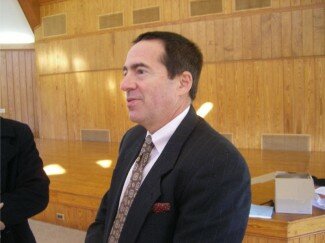 Bill Shmidheiser is the attorney handling Farm Credit's new acquisition, Kluge Estate Winery. PHOTO BY LISA PROVENCE
Bill Shmidheiser is the attorney handling Farm Credit's new acquisition, Kluge Estate Winery. PHOTO BY LISA PROVENCE
Everything is still operating, says Bill Shmidheiser, the attorney for Farm Credit. “I keep hearing we closed it down,” he says. “If you drove out there today, you’d see people pruning the vines and topping off the barrels.”
Moreover, says Shmidheiser, the inventory is now bolstered by some of the 15,000 cases of Kluge wine that failed to sell at another auction in a Madison warehouse.
Reports from Madison suggest that bidding at the December 11 wine auction was halted when per-case prices slipped as low as $2–- not enough to pay the state's alcohol tax.
“We sold a good bit of it, but not all of it,” he says. Wine that was unlabeled and couldn’t be sold is now labeled for sale at the Farm Shop, which is doing a good business that’s supporting the operation, says Shmidheiser.
Moses, however, questions the wisdom of grabbing a business that he and his wife have more experience running than Farm Credit.
“We were starting to turn the corner,” says Moses, asserting that the company was on track to do $2.5 million in sales in 2010. “In times of crisis, it all depends on the approach of the lender."
“Obviously, the bank has no interest in being a winery,” says attorney Shmidheiser. "They do not call loans of businesses that are making money.”
Moses contends that Farm Credit's actions “created a panic” that caused other lenders to follow suit.
Sonabank, which holds an $8.2 million note on the couple's nearby 511-acre Vineyard Estates subdivision, and Bank of America, which holds the $22.8 million mortgage on Albemarle House and its 98-acres, soon initiated foreclosure proceedings of their own.
Neither Bank of America attorney Jonathan Hauser nor Sonabank trustee James Autry returned phone calls from a reporter. But Shmidheiser disputes any notion that Farm Credit acted rashly.
“Farm Credit’s mission is to promote agriculture,” says Shmidheiser. “They go further to avoid foreclosure than anyone. Foreclosure is the last resort.”
Albemarle House Not since a savvy Shadwell native decided to build a mansion atop a hill that he dubbed "Monticello" has an Albemarle County dwelling created such shock and awe as the 1985 completion of Albemarle House. The eight-bedroom, 13-bath mansion contains marble floors, statuary-ready niches, and a movie theater inside its nearly 24,000 square feet of neo-Georgian space.
“What is significant is the aspiration of creating a grand, English-style country house of the 18th century,” says UVA architectural historian Richard Guy Wilson. With a chapel, formal gardens, and sculpture, it recalls "an English country seat," he says.
However, in a county loaded with actual historic homes, such as the oft-sold Castle Hill, Albemarle House may suffer from a dearth of historical status, says Wilson, although it does carry the pedigree of David Easton, an architect who rose to fame for designing baronial mansions that graced the pages of Architectural Digest and Town & Country. How much that pedigree will bring in a sagging real estate market is another matter.
“Time will tell,” suggests Wilson.
Wilson notes that the Georgian style has never gone away, although it’s rarely done on the scale of Albemarle House.
Even Easton has stopped designing everything in the luxe manner, and he enthuses to the Hook about an 1,800-square-foot modular house he's designing.
"The value system that created Albemarle House is one I totally understand at that point in history," says Easton. "Those big dinner parties hark back to another age."
Perhaps it all depends on what the definition of "history" is. In September 1989, the American governors assembled in Charlottesville for a massive education summit. To attend a fundraiser for Doug Wilder, then just two months away from his historic election as Virginia's first African-American governor, a rising star from Arkansas slipped over to Albemarle House and later tried to sit next to a married woman.
"He zeroed in on us and continued to make eye contact with me throughout dinner. He was being flirty and assertive, and I felt uncomfortable, for myself and also for my husband."
That's from Target: Caught in the Crosshairs of Bill and Hillary Clinton by Kathleen Willey, who later accused Clinton of groping her in the White House.
“When it came on the market at $100 million,” says realtor Ross Stevens of Albemarle House, “it was absurd, unless it was bought by some sheik or oil baron.”
Stevens believes the manor’s layout was designed for a lifestyle that's fallen from favor, at least among those who don't keep a staff on the payroll.
“When it was built, its purpose was to entertain large numbers of people,” notes Stevens.
The listing price for the house dropped to $48 million last February and was slashed again in November to $24 million.
“Certainly, it’s going to come across as a distressed sale,” says Stevens, principal of Stevens & Company, which has handled many multi-million-dollar transactions.
Couldn't the new price attract bargain seekers?
“I haven’t had any buyers in that price range,” says Stevens.
“There is a buyer on the horizon for Albemarle House and the winery,” Moses says cryptically. “In a strange way, our interest and the banks’ are on the same page.”
Loads o' litigation Along with the banks seeking millions, vendors have filed tens of thousands of dollars in liens, mostly against Vineyard Estates. Local construction firms R.E. Lee and Ilex want $121,000 and $287,272 respectively. There's a $67,590 claim for painting by New Rochelle, New York-based Anton Sattler Management. Meanwhile, Richmond-based Safway Services wants $8,574 for scaffolding, and Charlottesville Aquatics seeks $2,837.
Bank of America filed a lawsuit against Patricia Kluge January 3 in U.S. District Court for its $22.8 million plus interest and legal fees. Five active lawsuits against Kluge are on the Albemarle County books, four of those filed by Farm Credit.
One concerns a seven-acre parcel containing a historic 1842 dwelling. Farm Credit contends that Kluge and Moses fraudulently put the property in the hands of a family member by conveying it to the John W. Kluge Jr. trust on September 9.
Moses tells a different story.
He says that when he and Patricia Kluge bought the 625-acre Ellerslie farm from the UVA Foundation in 2004 for $10.5 million, they placed most of the property under conservation easement because it would serve as the core of the Kluge Estate Winery and Vineyard LLC–- except for the contested house parcel, assessed for $612,500.
“We always intended it to go to the trust,” says Moses. “We forgot to transfer it.”
The trust for John and Patricia Kluge’s son holds 228 acres, according to county property records. The 3,900-square-foot house is used mainly for storage, says Moses. It has no mortgage and was not part of the property securing the Farm Credit loan, he maintains.
Farm Credit sees it differently.
“That is a significant property adjacent to the vineyards owned personally by Bill and Patricia,” says Shmidheiser. “It’s a grand old house in need of renovation.”
The lawsuit demands that the transfer be voided, although the term "fraudulent" used in the suit “does not mean we’re saying they’re bad people," Shmidheiser clarifies. But he's clear about this: "When you owe money to Farm Credit, you should not be making gifts."
Even after the bank took back the vineyard, the couple may still owe Farm Credit about $15 million, and Shmidheiser says there's still more litigation in the works–- between Farm Credit and Bank of America.
This time, it tears at the fabric–- literally– of Albemarle House.
Nearly two years ago, Kluge pledged tangible personal property to Farm Credit, says Shmidheiser. The new suit would alert Bank of America of items on which Farm Credit has a claim, such as chandeliers, fireplace mantels, and even curtains.
Can curtains really make a dent in a $15 million debt?
“They’re very, very nice draperies,” says Shmidheiser.
Wine impact Kluge and Moses certainly are not the first to have their vision exceed cash flow, especially in an economy still limping along after a crash like 2008 that took wineries down with the housing market.
Although the state heralds its fledgling wine industry, it’s still a hard row to sell Virginia wines outside the state, says Moses.
“Any loss of anyone in the wine industry is a loss to the state,” says Rock Stephens, chair of the Virginia Wine Board. “They were one of the largest; they were in the top 10.”
Kluge Estate wines “had a very good reputation and won lots of awards,” says Stephens, who makes wine on a much smaller scale at his Vineyard at Point Breeze in the Delmarva Peninsula hamlet of Belle Haven, where he’s one of its two full-time employees.
“Agriculture is a tough business,” says Stephens, and making wine is harder than growing soybeans.
“Every year there is something else that hits you–- weather, the economy, trying to get a loan,” he says.
And the collapse of Kluge Estate serves as a cautionary tale for winemakers.
“If you’re going to borrow money from someone, you’re giving up some measure of control,” observes Stephens. “If you read the fine print of a lot of loans, they can call it for any reason at all if they want to get out of the wine business.”
Stephens worked with Moses on the state wine board. He notes the quality of the Kluge vines and wants to see someone invest in the now bank-owned winery.
“Frankly, we would have been in better shape with a lower quality wine and different distribution,” concedes Moses, calling Virginia winemaking still a “niche industry.”
It’s also a bipartisan one, and he was first appointed to the wine board by Democratic governor Mark Warner and most recently reappointed last year by Republican Bob McDonnell–- until he unceremoniously resigned.
“I said I’m in deep sh*t and had to resign,” Moses says he told the Republican.
Fall from grace At the time of Kluge's 1990 divorce, some news organizations, citing an anonymous source, reported that the settlement left her with the interest on a billion dollars. A few years later, W magazine, also citing an anonymous source, pegged the payout as a flat fee of $15 million. Citing a gag order, Moses declines to clarify the payout, but clearly the current mess casts grave doubt over the initial tale.
Moses does not immediately answer when asked about how the couple is dealing with the collapse of their ambitions.
“This is nothing," says Moses. "I’ve buried a daughter."
In 2002, Moses lost his 26-year-old daughter to a sudden medical condition.
"What is this?" he continues. "A business that didn’t succeed because we couldn’t work out things with the bank? At least no one died.”
Moses graduated with Phi Beta Kappa honors from UVA in 1968 and took a law degree from the University of Pennsylvania law school in 1971. He acknowledges that sometimes no matter how successful one has been, some times things don’t work out.
“Like many business people who are entrepreneurs, you make mistakes,” he says. “We misjudged the economy. We misjudged this bank.”
It’s hard not to wonder how the loss of the winery and the house on which she lavished so much attention has affected Patricia Kluge, who has fascinated–- and sometimes polarized–- Charlottesville since she moved here in the 1980s, particularly after her 1990 appointment to the prestigious UVA Board of Visitors when her own educational career had ended without a high school diploma.
Kluge's colorful past includes grabbing trends before they happen. She had a 1960s Baghdad-to-Britain upbringing with an Austin Powers-era marriage to girlie mag publisher Russell Gay. In 1981, six years before Oliver Stone's original Wall Street, she married corporate titan John Kluge–- before he became a billionaire.
The combination of serving as a not-always-dressed columnist for her first husband's magazine, Knave, along with her appearance in the 1969 British sex film The Nine Ages of Nakedness (in which a clothed Kluge makes a cameo appearance as a bellydancer) provoked rumors of a more energetic entertainment career.
“She was engaged to a doctor in London when she met John Kluge,” says Moses. “She was not dancing on tables.”
Moses' daughter Kristin Moses Murray says her stepmother laughs about how she was practically the only one in Nine Ages who kept her clothes on. And Murray, the winery's former public relations manager, asserts that her stepmother’s reputation as a demanding boss is overblown.
“She works very hard,” says Murray. "She did not have to go out and create a vineyard from scratch.”
Moses and Murray express bewilderment over the venom that Kluge sometimes evokes.
"Here’s a woman who wrote a check and saved the Paramount,” says Moses. “She talked [former husband] John into the Kluge Children’s Rehabilitation Center. She put together the Kluge-Ruhe collection. And Club Yancey –- she funded that for three years,” he says of the after-school enrichment program at Yancey Elementary that offers students art, music and field trips.
More philanthropy is evident at the Kluge-Moses Science Building at Piedmont Virginia Community College, which opened last year.
The $1.2 million gift agreement calls for 10 annual payments of $120,000, and so far, the college has received five payments, all on schedule, according to PVCC president Frank Friedman.
“The last time I spoke with Bill Moses,” says Friedman, “he reiterated their commitment to paying it in full.”
Moses also chafes at criticism about Kluge’s business acumen, and points to her investment in Merlin Publishing when John Jr. was interested in baseball cards. In 1995, Topps acquired Merlin for $50 million, with Kluge reportedly holding a 40 percent stake.
She also was ahead of the vitamin water craze, according to her husband. “She’s a very astute businesswoman,” he says.
What about Fuel, Kluge’s gourmet gas station on East Market Street that’s been on the market since closing its doors in 2006?
“It wasn’t losing an immense amount of money," says Moses. "We just didn’t have time to get it to turn the corner. We’re still trying to sell it."
Despite the stunning collapse, Moses says his wife is going to move on.
And for a woman who in her pre-winemaker days was frequently described as a socialite, Moses chooses an unexpected film character to compare her to: The Black Knight in Monty Python and the Holy Grail, who continues to fight even after his arms and legs are hacked off.
Says Moses: “It’s a mere flesh wound.” #
This online archived story has been adjusted to correct the following errors: • The movie in which The Black Knight appeared was Monty Python and the Holy Grail, not Life of Brian as we reported, • Blenheim Road developer Thomas Sullivan never offered Albemarle's most expensive spec house, as we reported; he just sold the land on which it was built. • Albemarle House's kitchen occupies the mansion's main floor, not the ground floor, as we reported.
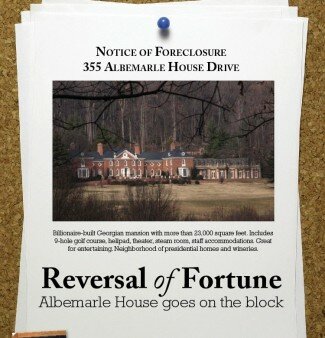
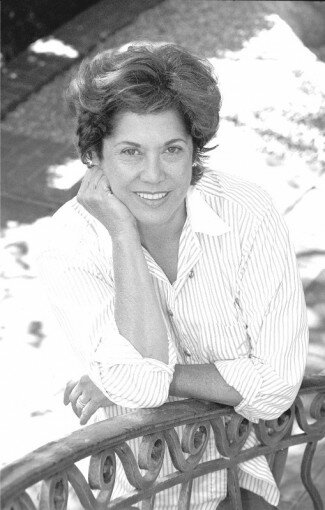
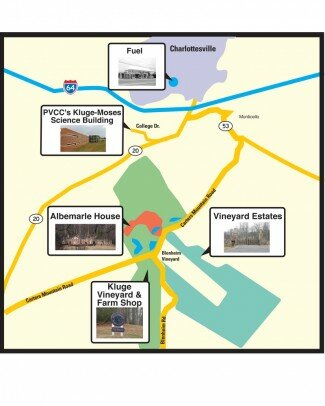
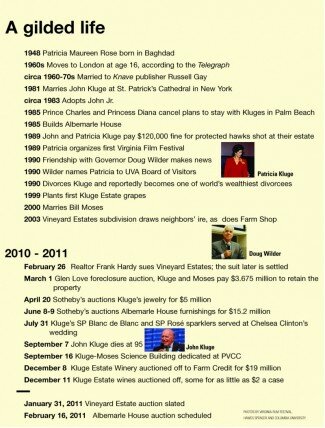
39 comments
What goes around comes around
The property will not be sold Feb 16th. The beat goes on...........
This sort of story is an instructive lesson in the practices of our times where nobody seems prepared to live within his means and everyone lives an aspirational life-style. Even someone as wealthy as these people was not content to be merely rich and wanted even more. Everyone in the country seemed to lose their heads during the recent Ponzi decade and joined in the great collective grift the economy had become. Some of us did not and we're feeling rather smug now.
About the mansions. Who are these people? They keep
to themselves for sure. And the turnover seems high.
I've often wondered about these demographics as I've
watched this county change so much over the decades.
Patricia Kluge, Bill Moses, and John Kluge have been a part of the Charlottesville/Albemarle community. They have shared their dreams - and we have watched many of them mature. The communities have learned and benefited from their being here. They have not been misers on the hill in isolation.
Rich and poor and banks are suffering with the bank's approach of "taking(foreclosing)" instead of "working with". Financial war is hard on the person, the family, the community and the nation. Are we all so stressed as not to extend encouraging words, a helping hand or friendly advice?
I have not had the pleasure of knowing the Kluges or Moses personally - though people I know who have worked with them are complementary. In their time of need, where is the community they have worked with?
Yawn..Wake me when its over.....
Another Rich Person sob story WFC's about any of this ??? Oh I know other rich people do .How about sone real news from this "Fish Wrap" for a change
PAT AND BILL KLUGE MISGUIDED, WHO MADE POOR BUSINESS DECISIONS. RUNNING BEFORE THEY COULD WALK. OVER PRODUCING AND OVER SPENDING.
WHO EVER MADE THE DECISION TO LEND THEM THAT AMOUNT OF MONEY NEEDS TO STAND UP AND TAKE HIS PUNISHMENT.
YOU REAP WHAT YOU SOW.
NO SYMPATHY, EXCEPT TO ALL THOSE WHO HAVE LOST THEIR JOBS.
Ive become used to cheese sandwiches...Sometimes without the cheese.
Does this mean Patsy will be clipping coupons like the rest of us?
She could get a job as a coal miner and see how much she can save up.
"fish wrap" ha ha Blimey! No really, way too much reading for my adled mind. I wish them the best o' luck though.
If she needs to make some money, she can apply for a job at the new Kohl's.
Maybe the UVa or a museum could buy it and have a large art museum maybe along with items in the Special Collections at UVA (that space to show is never there). It would be a nice destination besides Monticello, Ash Lawn, & Bailey Art Museum extention. (no museum to the excess of the 80s needed)
I like the Black Knight analogy but he was in Holy Grail, not Life of Brian. Please correct this.
I read this, and thought of one word: "rosebud".
And actually, I thought this was a pretty well written article. That's amazing to me this county seems to have so many mega-mansions.
Perhaps Mr Stevens has never been inside Albermarle House. Unless the house has undergone significant renovation in the past few years, the kitchen isn't in the basement. There have always been two on the main floor. One was a large commercial kitchen, with extensive butler's pantry connecting it to the dining room. The other was part of the family room and featured a beautiful Aga range.
If they wanted a business partner to share the unsecured risk then they should have found wall street investors. Farm credit only gives secured loans. When the collateral is at risk the bank pulls the loan. That is not "fine print" that is common knowledge. (and common sense)
Perhaps farm credit would do a real estate swap for bisquit run and we could turn Albemarle House into a commune for the homeless.
Interesting story, but I don't get the significance of the Clinton story in the middle when talking about the history of big mansions around here. Was that just a juicy detail that had to be included for gossip sake? Doesn't flow with the story at all.
The movie with the Black Knight is Monty Python and the Holy Grail.
Wolf..Nipple..chips..among many other great quotes from life of Brian.
@Yes - no, the problem is not the wine (that would never have been a going agricultural concern) - the problem was the ridiculous real estate development plans - an enclave of mega-mansions for the mega-rich? The vines and wine were just decorative landscaping.
@King Ralph - the "liberal Democrats" aren't the people running Farm Credit - they aren't the people making a quick buck fronting the cash - other people's money - for this boondoggle. This kind of financial, quick-buck folly is straight out of the Trickle-Down playbook.
A box of Spudnuts bets the house will of course "sell" on Feb 16, to the lienholder as all foreclosures do these days, since all foreclosures involve underwater properties. What happens then is the house sits on the market eternally "chasing the market down" until it is eventually liquidated at a huge loss, probably well under half of what's owed. Even at the peak of the market, if my memory serves, it never assessed at more than 16-17M. These days such a house would be hard pressed to command 10M in Santa Barbara or LA's tonier districts, much less in Albemarle County. The market for such mega-houses has taken a major hit the last few years.
Mmm, spudnuts.
I'll give the bank $1.5 million for it. :)
But then I would have to worry about how to heat and cool the place. Can you imagine the monthly utility bills in a place so large?
"All in all, it’s a long run for the ros©s." Ha! This was a good article, factual, careful, well sourced. And this Moses guy comes across as sensible and straightforward. Maybe the only good decision Pat Kluge has made in the last decade was marrying him.
Do these sales take place, literally, on the courthouse steps? Perhaps going inside would be a good idea.
I was at the Kluge Estate Winery yesterday, and I felt very sad. The place is a dismal shell of what it used to be. Yes, Patricia Kluge "lived big," but she had the money to live laviously and dream big. Kluge certainly has had a huge streak of bad luck recently, but perhaps if there had not been the recent downturn in the economy, the winery and her other business ventures might have continued to prosper. Let's also not forget that Kluge has not used her money just for herself, for she has donated money to many area worthy causes and places such as Piedmont Virginia Community College. Rather than focusing on the negatives I've heard people voice, or in written comments I've read on the web and other places, I prefer to be sympathetic because Kluge's dreams have been crushed (especially as it relates to the winery and the estate homes). Her financial worth has taken a dive, although I doubt she will ever be ranked among the poor. My dreams are important to me; my possessions and collections certainly are far less valuable than Kluge's, but I enjoy them. I don't fault Kluge for being rich, or for dreaming big. If I had the money and opportunities she has been afforded, it is likely I would mimic her lifestyle. I ask, "Is there one among us who would not enjoy doing the same?" Lynn Y.
hey Lynn: is it true that the Kluge winery is selling their inventory at $3 per bottle?
Ms. Kluge can still live large- just on the coupons associated with being wealthy. This is just one way to stay wealthy after the passing of the great person who created the wealth.
$3/bottle- yes, but you have to buy the stock.
Yeesch to Lynn Young. There are MANY who have no desire
to live in big houses, entertain, schmooze, own a lot
of glitzy junk or whatever else some rich people do. Hard to believe!!!!! In fact there are many rich people who don't
live like that.
Deleted by moderator.
Boo Hoo
Isn't the problem that Virginia wine is fairly mediocre? Why invest tens of millions in something like that?
Deleted by moderator.
ââ?¬Å?Hi, I’m Robin Leach, welcome to another edition of the Life Styles of the Rich and Famous. Today we visit Albemarle House valued at $100 million dollars with 24k gold chandeliers”Š.”
*yawn*
ââ?¬Å?Hi, I’m Robin Leach, welcome to another edition of the Life Styles of the Rich and Famous. Today we visit Albemarle House valued at $24 million dollars with sterling silver dinnerware”Š.”
*yawn*
ââ?¬Å?Hi, I’m Robin Leach, welcome to another edition of the Life Styles of the Rich and Famous. Today we visit Albemarle House on the auction block with cotton drapes, cardboard boxes and spider webs”Š.”
*yawn*
Even if you get this house for $1.00, who would want to pay the taxes and manage the maintenance?
Perhaps it is called spending what you have, then seeing that you have spent it all- hardly. Ms.Kluge has plenty of assets and liquidity- she just wants out. The quickest way out is to walk away. Banks don't like it, we don't like it- but it happens all the time. It takes walking away from 50- $500K ranches to equal this walk.
The house will not sell on Feb 16th.
The Fuel Company building next to the Belmont bridge, that has been for sale now for months or more than a year it seems. Maybe we will be reading something about that later this year. But I do think the house would make a great Art Museum.
Invincibility and Overzealousness are false emotions that cloud wise business judgement.
Another one for the textbooks.
It is discouraging to read the hatred of comments such as "WFCs about a sob story of rich people...".
You don't need to LIKE the rich but YOU DO NEED THE RICH. The rich, even in this story, are the ONLY people who can donate to organizations, educational facilities and actually make them become a reality. The hundreds of people once employed by the Kluges care about the rich people. The millions of dollars in state taxes paid to support our local schools, roads and services were positively influenced by these rich people.
Envy is an ugly character trait, even more so than greed. It is the RICH who buy the cars, homes and services that employ FAR MORE people - not just in Virginia - who make and service the 'industry of the rich'. You eliminate the rich and you've just got a bunch of low wage, Wal Mart shopping Americans who don't have those jobs.
It's an unfair critique and such a pathetically easy target to aggress against someone who by virtue of who they are can rise and fall in the public eye. A little humanity and kindness goes a long way. You may not be rich, you may not want to be rich, but you can't resent people who actually do work hard and try to do some good along the way.
I think a tell-all article about YOUR lives might put things in perspective. Maybe it's the check you bounced, or the late payment you paid on your credit card, or the assistance you had to seek to pay your heating bill or the loan on your car...the scale is definitely different...but the hurt is the same.
The rule for all should be Work Hard, Be Nice, Don't Judge